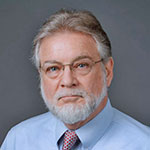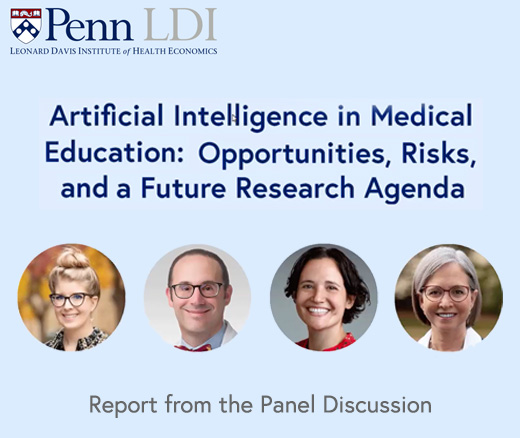
New National Study Finds Doctors Paid Less for Treating Black and Hispanic Patients
Physicians Were Paid About 10% Less for Visits Involving Black and Hispanic Patients, With Pediatric Gaps Reaching 15%, According to a First-of-Its-Kind LDI Analysis
Population Health
News

What was it like to be named the new director of the Centers for Disease Control and Prevention (CDC) when you don’t have any contacts at the White House or in Congress and don’t know CDC’s operational logistics or those of the affiliate state health departments it works with across the country—and all this at a time when the agency is struggling with one of its worst declines in public trust as the COVID-19 pandemic continued its deadly spread?
Rochelle Walensky, MD, MPH, who was the incoming new CDC Director as President Joe Biden took office in 2021, can answer those questions—and did at a Fireside Chat at the University of Pennsylvania co-hosted by the Leonard Davis Institute of Health Economics (LDI) and Penn’s Carey Law School.
The ground rules of the discussion moderated by LDI Senior Fellow and Law School Professor Allison Hoffman, JD, were that it would focus on Walensky’s reflections on her two-and-half year tenure at the CDC and not on current political issues related to the incoming administration’s appointees.
“During my visit to Penn, I’m trying hard not to get political,” Walensky told the standing-room-only crowd in the Wharton School’s Steinberg-Dietrich Hall. “What I will say is that I never went into a patient’s room and asked them how they voted. There are good people in these health care agencies that vote in both directions. Right now, we have a lot of campaigning around cabinet positions but not a lot of what governance will look like. Many of the things we’ve heard talked about or floated [in relation to changes in health care] are actually hard to implement. Don’t get me wrong, I think there are plenty of things that can be eroded or challenged but we don’t yet have anything to say about a particular thing being good or not so good for policy.”
During the first year of the COVID-19 pandemic, as vaccine research was frantically underway, Walensky was working as a Boston researcher engaged on the front lines of the pandemic in Massachusetts and analyzing how a not-yet-approved vaccine could most effectively be distributed across the country in ways that supported the widest possible uptake. One of the conclusions of her work was that it would be crucial “to promote widespread public confidence in COVID-19 vaccines, and to encourage continued adherence to other mitigation strategies, even after a vaccine becomes available.”
As the Trump administration was transitioning to the Biden administration in January 2021, Walensky was a widely respected infectious disease expert working as Chief of the Division of Infectious Diseases at Massachusetts General Hospital and a Professor of Medicine at Harvard Medical School who had no aspirations of becoming the head of a federal health agency. But a cold call from Ron Klain, Biden’s Chief of Staff, changed that. She was soon on a Zoom call with both the President elect and Vice President elect.
“There was generally a good feeling about me in the infectious disease community as someone who knew infectious disease and would again make science a top priority,” Walensky remembered. “The newspapers said I had no government experience and that was true.” She recounted her concerns when realizing that in order to work with the White House, Congress, the CDC staff, the state health officials, and the press, you needed their trust. “But no one from any of those groups was in my Rolodex,” she said, pointing out that most people in the highest positions of government have people in their Rolodex from all those spaces.
She credited CDC Acting Chief Operating Officer with assisting her in learning the logistical ropes of the agency quickly. “She had been around for 25 years and knew how to get stuff done. She was very helpful and very strategic,” Walensky said.
But making those settling-in challenges all the greater, the 2021 presidential transition occurred after the outgoing administration had significantly politicized health care policy, fostered an anti-science environment, and contributed to widespread misinformation that negatively impacted vaccination rates and likely resulted in substantial numbers of preventable deaths.
She said public frustration with the CDC was such that CDC security made employees remove the CDC parking stickers from their cars to avoid having the vehicles vandalized by irate citizens.
“The morale of the place was really, really low,” said Walensky. “And on top of that, I had a leaking problem because people inside the agency did not trust their leader and were going straight to the press with things.” She noted that in the past, many people throughout the CDC had never met their director.
In a comprehensive campaign to connect better, she did one-on-one meetings with 125 division directors, giving them her cell phone number. She did a similar thing virtually with 64 state and territory health officials and CDC office heads in 60 different countries.
During her tenure, Walensky took on several controversial high-profile issues. She ordered a comprehensive internal review of the CDC’s performance throughout the COVID-19 pandemic and issued a scathingly critical public report on her own agency’s shortcomings. She issued a declaration formally recognizing gun violence as “a serious public health threat.” And she similarly officially declared racism to be “a serious public threat” and announced several new CDC efforts to address racism as a fundamental driver of racial and ethnic health inequities, such as the much higher COVID-19 infection and death rates in minority communities.
“I just said, ‘I’m done documenting the problem,'” Walensky said. “‘We know that there is racism in health care. We know that if you look at mammogram or cardiovascular or coronary artery bypass grafting screenings there are discrepancies and disparities by race. Let’s try to improve that rather than just document it again,'” Walensky said.
“I’m happy to say that after we made that declaration, 200 health departments across the country did the same thing,” she told the Fireside Chat audience. “We emphasized that this was mission critical, and our own people got behind that. They voted with their feet, coming to meetings because they wanted to be involved.” (Continued below photo)

Answering a question from Hoffman about what sources of information and data she found most helpful in decision-making, Walensky noted that her MPH degree was in decision science. “What became clear to me was that any decision at the CDC that wasn’t hard didn’t get to me,” she said. “That meant that every decision I did make was generally wrong for somebody because, by definition, if it was hard, someone was going to be hurt by it.”
One particularly difficult decision arose in July of 2021 when data came in from Barnstable, Massachusetts that demonstrated that people who were vaccinated could continue to transmit a particular variant of COVID-19.
“That was true of a Delta variant, and it meant that we needed to put masks back on. That was an awful kick in the stomach,” said Walensky. “It was early data and unpublished. I said, ‘okay, we need to see it in a couple of other places before we create a national policy.’ We talked to the U.K. the next morning and they had also seen it. There was another prison outbreak in Texas, so we knew we had to take action and put the masks back on and that was not a very popular decision. The question became ‘how long is it going to take for this data to be published to demonstrate to all society that this was the right thing to do?’ So, I made the decision to make the policy and take the heat for not having data immediately.”
Hoffman asked, “Were you thinking about litigation risks—about decisions you might make or support states in doing that might backfire?”
“When I first arrived at the CDC, I expected to be on Zoom screens with 10 doctors, 10 researchers and 10 epidemiologists, but half the time I was on Zoom with 10 lawyers,” said Walensky. “It was hard enough to get the science straight and then I was learning all this legalese from White House counsel, Department of Justice, Health and Human Services, and CDC—a lot of lawyers. It taught me that there is a huge need for health care law expertise in the government space.”
She also pointed out the importance of compartmentalization when making a series of momentous CDC decisions. “When you are about to make a really heavy decision about vaccine policy, you cannot let that heaviness move with you to whatever you’re about to do on dog importation or funneling travelers from Uganda during an Ebola outbreak. Just because you landed one bad headline, you can’t take the headline and turn it into you. You just have to put your head down and move on to the next thing.”
“You think the job’s all about health until you realize we were just having a conversation about a mask mandate and travel corridors, which seemed very reasonable for airplanes or trains, and everyone was on board,” said Walensky. “But nobody expected the Coast Guard to get really mad because wet masks could make it harder to breathe in certain working conditions. So, you start to think more about what are the downstream implications of a decision? What can’t we see?”
And then, there are the utterly unexpected demands of the job. “I didn’t know I was responsible for dog importation, but it was my job,” Walensky said. “About five months in, there was this dog imported from Azerbaijan that had rabies. It had been imported from Chicago, came to Pennsylvania, and had been in contact with 15 people. So, we had to have stricter dog importation rules and so, we put those rules in. But then, I started getting letters from Congress and the Department of Defense because the military couldn’t get its dogs back into the country when they were trying to return home. I was getting a thousand pictures of dogs in my inbox.”
As the session was ending, Hoffman asked Walensky to describe the work-life balance of a CDC Director.
“The only balancing thing in my time at the CDC was the knowledge that it was not going to be forever,” said Walensky who resigned as CDC chief in June of 2023 as the Biden administration ended the COVID-19 national emergency status. “The idea that you could do your job and then protect your time for family dinners and the like—there was none of that. It was a 24/seven job. If you didn’t shower by 8 a.m. on a weekend, you didn’t get in a shower, because you were on Zooms and calls all day long.”


Physicians Were Paid About 10% Less for Visits Involving Black and Hispanic Patients, With Pediatric Gaps Reaching 15%, According to a First-of-Its-Kind LDI Analysis

A New Review Finds Hospital Mergers Raise Prices Without Improving Care, and Urges Regulators to Stop Accepting Quality Claims to Justify Consolidations

CMS’s Main Risk Adjustment Method Underestimates Rural Patients’ Health Risks, LDI Fellows Show, Potentially Reducing Access to Care in the Heartland

Experts at Penn LDI Panel Call for Rapid Training of Students and Faculty

A Proven, Low-Risk Treatment Is Backed by Major Studies and Patient Demand, Yet Medicare and Insurers Still Make It Hard To Use

New Study From LDI and MD Anderson Finds That Black and Low-Income, Dually Eligible Medicare Patients Are Among the Most Neglected in Cancer Care